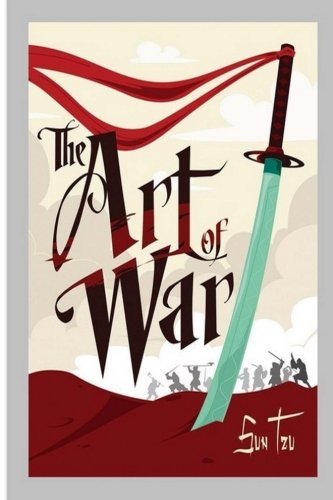Review:
The Art of War is a collection of stratagems (bite-sized, aphoristic strategic teachings) by chinese military commander Sun Tzu (or Sun Zi or a dozen variations) – and well over 2500 years old. So why this review? Because The Art of War still makes the management book bestseller lists (like here, here, here or here).
This review is based on the annotated german translation by Patrick Lindley of the 1910 english translation by Lionel Giles. There are several versions around, so your experience may vary slightly. I chose one of the tackier cover arts for this blog post, by the way.
The Art of War of the past
Sun Tzu, as a seasoned general, has a pragmatic view of war and combat. Peace is best for everyone, but if war is inevitable, unnecessary battles have to be avoided. If a battle is inevitable, it should be fought with as few casualties as possible. According to Sun Tzu, to achieve this goal one needs preparation, discipline and execution.
To prepare for war, the wise leader adopts a holistic view of war, and takes into account the terrain, weather and timing, numbers and motivation of troops on both sides, and two dozen additional inputs. The idea is to gather as much data as possible.
Discipline is maintained by respecting the needs of the soldiers, by regarding them with paternal affection, and by fair rewards and punishments. According to Sun Tzu, commanding people into battle needs a strict hierarchy and line of command, where an order goes from the sovereign to commander, from commander to the generals and finally from the generals to the soldiers. My version of The Art of War brings the story of a soldier who, putting his life in great danger, manages to take two enemy generals as prisoners – and is promptly executed for insubordination, because he acted without order.
When all circumstances are in one’s favor, Sun Tzu advises to strike ruthlessly, but sensibly. The trick is to only fight battles you are sure to win. If an opportunity arises, the wise commander attacks with the intend to win as quick as possible with minimum casualties, instead of looking for glory and fame. When circumstances are not in one’s favor, the commander relies on tactical retreats, surprising maneuvers and deceit.
The Art of War of the present
Is any of that relevant for modern companies? There are dozens of annotated editions, books and articles interpreting The Art of War in any way you like, so let’s keep this short and simple.
Preparation is good, manage with data. As Sun Tzu says, get to know yourself (your employees, your brand, your unique selling proposition,…), your surroundings (markets, political climates,…) and your enemy (you decide if this means your competition or your customers). Discipline is ok. To care for the wellbeing of the people your are in charge of is kind leadership. If, however, you also insist on a strict pecking order, your company won’t retain the modern millennial employee for long. In the setting of a present-day company, it is still advisable to pick “battles” (marketing campaigns, takeovers,…) carefully. Always check if you have to compete with others, or if you can simply take your business elsewhere. And if you must compete, don’t waste resources on a battle unless you are sure to win.
You might want to try and apply Sun Tzu’s teachings on a personal level, interpreting yourself as the commander, your team as the soldiers and your internal competition and colleagues as the enemy. In that case, I personally believe that you are not on a happy and healthy career path. Cooperation and collegiality will always get superior results in the long run.
In conclusion, The Art of War can be inspirational even in a business setting, but please use your common sense. I would say, about 70% of the aphorisms are still good, and 30% did not pass the test of time, which coincidentally also is the official evaluation of another chinese leadership figure (who also read The Art of War).
If you see The Art of War on a manager’s desk or shelf, don’t automatically roll your eyes. Sun Tzu’s ideas from 500 BCE merit some attention today, in many contexts.
Key points:
- Pick your battles carefully
- Consider your resources, your enemy’s resources and your environment carefully
- Focus on achieving your goal, don’t be distracted
- Give yourself an edge
Author affiliations:
Sun Tzu (Master Sun) was a chinese general, strategist and philosopher who lived around 500 BCE. Hes is prpbably dead now, but his legacy lives on. Hundreds of interpreters, reframers and copycats make a living from Sun Tzu’s work. The Art of War gets still read today, inside and outside the military, making Sun Tzu one of the most influential strategists of all time.
Review copy:
copy bought
marix Verlag/Verlagshaus Römerweg, 17. August 2011
ISBN-10: 3865390072
ISBN-13: 978-3865390073
Get the book on Amazon.de*
Get the book on Amazon.com*
Get the book on Amazon.co.uk*
Get the German version on Amazon.de*
 The Art of War
The Art of War

No Comments